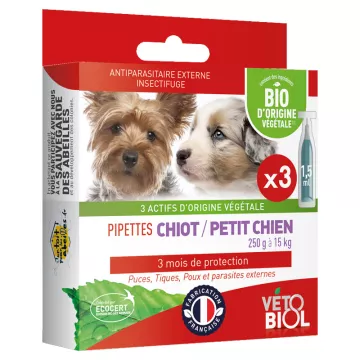What is the ideal age to adopt a puppy?
We recommend adopting a puppy when it has reached the age of eight weeks. At this stage, the puppy has had enough time to be weaned from its mother and begin its social development with its brothers and sisters. Early adoption can lead to behavioral and health problems, as puppies learn a lot during the first few weeks with their mother.
How to prepare your home for the arrival of a puppy?
Preparing your home for the arrival of a new puppy involves several important steps:
- Secure the environment: Make sure that all toxic substances, small objects that can be ingested, and potentially dangerous areas are out of reach.
- Create a dedicated space: Set up a comfortable area for the puppy with a bed, toys and access to fresh water.
- Provide toys: Puppies need stimulation. Provide sturdy chew toys to help him manage his need to chew.
What vaccinations are essential for puppies?
Vaccines play a crucial role in your puppy's health. The main ones to administer include :
- Parvovirus and distemper vaccines: These diseases can be fatal, and early vaccination is essential.
- Rabies vaccine: Mandatory in many countries, it is often administered when the puppy reaches three months of age.
- Hepatitis and leptospirosisvaccines.
It's essential to follow a strict vaccination schedule, usually drawn up by your vet.
How to properly socialize a puppy?
Socialization is fundamental to a puppy's behavioral development. Here are some effective methods:
- Gradual exposure: Gradually introduce your puppy to other people, dogs and new environments.
- Training courses: Specific courses for puppies can greatly help to socialize your pet safely.
- Controlled encounters: Organize encounters with other well-trained, vaccinated dogs to teach your puppy good social manners.
What is the ideal diet for a puppy?
A puppy's diet must be rich in essential nutrients to support rapid growth. Opt for a food specially formulated for puppies, which includes :
- High-quality proteins: Essential for muscle development.
- Omega-3 fatty acids: Important for brain development and skin health.
- Calcium and phosphorus: Crucial for the development of bones and teeth.
It's a good idea to talk to your veterinarian about adapting your puppy's diet to his specific needs, especially if he's a large breed or has special requirements.
How to manage a puppy's first nights at home?
The first nights can be stressful for a young puppy. Here are a few tips to make them more comfortable:
- Establish a routine: Create a consistent bedtime routine that can help make your puppy feel secure.
- Stay close: For the first few nights, sleeping close to your puppy can help him adjust to his new environment.
- Reduce stimuli: Keep the environment calm to avoid over-stimulation.
How to choose the right puppy in a litter?
Choosing the right puppy in a litter requires careful observation of each animal's behavior and health. Here are some key points to consider:
- Behavior: A puppy should be neither excessively shy nor overly dominant. Look for a balance where the puppy is curious and interactive.
- Health: Check for signs of good health such as clear eyes, a smooth coat and normal activity. Watch out for signs of possible infection, such as runny eyes or an excessively wet nose.
- Interaction with the litter: Observe how the puppy interacts with his siblings and mother, which may give clues to his future temperament.
What are the basic elements of puppy training?
Basic puppy training covers several essential skills that will make your life together easier:
- Cleanliness: Teach your puppy where and when to relieve himself.
- Basic commands: Teach simple commands such as "sit", "stay", "come" and "no", which are crucial to his safety and social behavior.
- Socialization: Encourage healthy interactions with humans and other animals to develop balanced behavior.
What types of collar or harness are recommended for a puppy?
Choosing the right type of collar or harness for your puppy is crucial to his safety and comfort:
- Harness: Recommended for puppies, as it distributes pressure over the body and reduces the risk of neck injury, especially in small breeds.
- Adjustable collar: Make sure it fits snugly, allowing only two fingers between the collar and the puppy's neck. Avoid choke collars, which can be harmful to young dogs.
How to manage puppy nipping?
Nibbling is a normal part of a puppy's development, but it must be managed effectively:
- Chew toys: Offer your puppy a variety of toys suitable for chewing.
- Redirection: If your puppy starts chewing on inappropriate objects, gently redirect his attention to a chew toy.
- Positive training: Use positive reinforcement to encourage good behavior instead of punishment, which can be counterproductive.
What common health problems can affect puppies?
Puppies can be prone to a variety of health problems, but some are more common:
- Internal and external parasites: Puppies can be affected by worms and fleas. Regular anti-parasite treatment is essential.
- Digestive disorders: Problems such as diarrhea and vomiting can occur, often due to changes in diet. Consult a veterinarian if symptoms persist.
- Infectious diseases: Make sure your puppy receives all his vaccinations to avoid serious diseases such as parvovirus and distemper.
